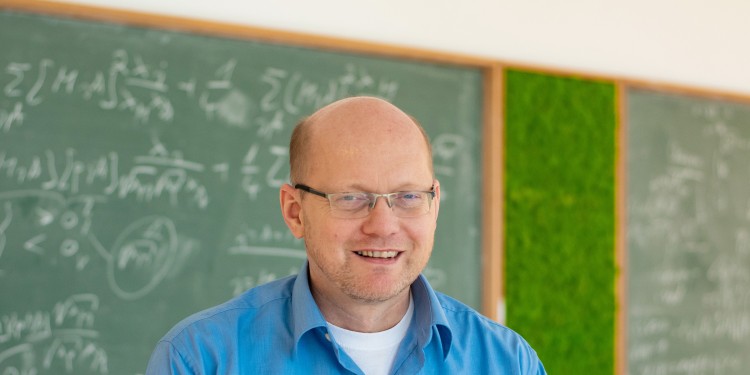
“That special moment when an idea becomes reality”
Prof. Burkhard Wilking, co-leader of the Differential Geometry working group at the Institute of Mathematics is to receive the Karl Georg Christian von Staudt Prize for his achievements in the field of theoretical mathematics. The ceremony will be held at the University of Erlangen-Nuremberg on April 22. Worth 25,000 euros, the prize is the most valuable one in Germany for mathematicians. In this interview with André Bednarz, Burkhard Wilking talks about his everyday work and the fascination which his subject holds for him.
Can you explain to someone like me, with a background in literature, what your everyday job looks like – in a practical sense too?
I’ll be pleased to try. My research is all about the study of geometric forms. People who live on a certain area – as we humans do, on the surface of the Earth – do not as a rule have the possibility of moving in straight lines in order to get from A to B. Instead, the shortest connections are so-called geodetic lines – aeroplanes, for example, essentially fly along a large circle to reach their destination. What interests me in particular are manifolds with a positive curvature …
... and this is where I have my first problems in understanding you.
Perhaps it’s helpful if I say that this property can be expressed geometrically by saying that the inequation c^2< a^2+b^2 is valid for every geodetic right-angled triangle. The problem – and it’s a fascinating one – is in understanding what consequences this property has for the invariants of the geometrical form.
To be honest, the formula wasn’t terribly helpful for me. But I can find some consolation in a quotation from your fellow-mathematician Bertrand Russell, who said: “Thus mathematics may be defined as the subject in which we never know what we are talking about, nor whether what we are saying is true”. Would you agree with that?
Mathematics is rightly considered to be the most precise of all sciences. Essentially, it’s about drawing mathematical conclusions under clearly defined conditions. These conclusions are indeed incontrovertible. Pythagoras’ theorem, for example, holds true for every right-angled triangle in Euclidean space. In practice, however, it can happen that mistakes are also made – because typically, in proofs of statements, conclusions are used which may appear to be trivial but aren’t. Russell may have been referring to a more fundamental problem. Mathematics is based on a system of axioms whose consistency cannot be proven. So we need to believe in the consistency of natural numbers – everything else then has to be justified with a proof. For that reason, I wouldn’t personally espouse Russell’s quotation.
You deal with theoretical mathematics – also known as ‘pure mathematics’ as it doesn’t deal with any applications outside mathematics. Nevertheless: is there a connection – however remote – between your work and everyday life?
There certainly is. For example, the global navigation satellite system known as GPS for short. The GPS satellites are equipped with atomic clocks and they transmit their time signals, which are received at different times at a given point because the speed of light is finite. But now there’s the problem that, in the General Theory of Relativity, time and space form a single entity and there’s no way that the time dimension can be separated from the space dimension. What happens in the GPS system is that the atomic clocks in the GPS satellites run faster because they experience less gravitation. Also, the relative speed of the satellite to the observer plays an important role. In short: the GPS system only functions because physicists took all this into account when they designed it.
Have there been any special moments in your career so far?
It’s a special moment when you realise that an idea has a serious chance of becoming reality. Although you’ve not yet reached your goal – because there are still some obstacles to overcome – you no longer have a huge mountain in front of you which you have to climb, but just several smaller hills, and climbing these seems feasible. That’s how it was in 2005, for example, after a colleague and I had developed a new method of classifying manifolds with a positive curvature operator by means of the Ricci flow. In such situations, it can happen that for days and weeks on end nothing else matters apart from reaching a mathematical goal.
Caption:
Prof. Burkhard Wilking is only the eighth winner of the prestigious Staudt Prize.
Photo: Münster University - Viktoria Liesche
